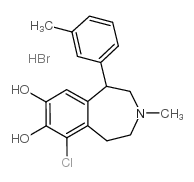Perinatal n-3 fatty acid deficiency selectively reduces myo-inositol levels in the adult rat PFC: an in vivo (1)H-MRS study.
Robert K McNamara, Jessica Able, Ronald Jandacek, Therese Rider, Patrick Tso, Diana M Lindquist
Index: J. Lipid Res. 50(3) , 405-11, (2009)
Full Text: HTML
Abstract
To investigate the effects of omega-3 fatty acid deficiency on phosphatidylinositol signaling in brain, myo-inositol (mI) concentrations were determined in the prefrontal cortex (PFC) of omega-3 fatty acid deficient rats by in vivo proton magnetic resonance spectroscopy ((1)H-MRS). To generate graded deficits in PFC docosahexaenoic acid (22:6n-3) (DHA) composition, perinatal and postweaning alpha-linolenic acid (18:3n-3) (ALA) deficiency models were used. Adult male rats were scanned in a 7T Bruker Biospec system and a (1)H-MRS spectrum acquired from the bilateral medial PFC. Rats were then challenged with SKF83959, a selective agonist at phosphoinositide (PI)-coupled dopamine D(1) receptors. Postmortem PFC fatty acid composition was determined by gas chromatography. Relative to controls, PFC DHA composition was significantly reduced in adult postweaning (-27%) and perinatal (-65%) ALA-deficiency groups. Basal PFC mI concentrations were significantly reduced in the perinatal deficiency group (-21%, P = 0.001), but not in the postweaning deficiency group (-1%, P = 0.86). Among all rats, DHA composition was positively correlated with mI concentrations and the mI/creatine (Cr) ratio. SKF83959 challenge significantly increased mI concentrations only in the perinatal deficiency group (+16%, P = 0.02). These data demonstrate that perinatal deficits in cortical DHA accrual significantly and selectively reduce mI concentrations and augment receptor-generated mI synthesis.
Related Compounds
| Structure | Name/CAS No. | Molecular Formula | Articles |
|---|---|---|---|
 |
SKF 83959 HYDROBROMIDE
CAS:80751-85-5 |
C18H21BrClNO2 |
|
SKF83959 is a potent allosteric modulator of sigma-1 recepto...
2013-03-01 [Mol. Pharmacol. 83(3) , 577-86, (2013)] |
|
The D₁ dopamine receptor agonist, SKF83959, attenuates hydro...
2012-01-01 [Mol. Vis. 18 , 2882-95, (2012)] |
|
Phosphatidylinositol-linked novel D(1) dopamine receptor fac...
2009-08-01 [Neuropharmacology 57(2) , 164-71, (2009)] |
|
Assessment of jaw movements by magnetic sensor in relation t...
2010-04-25 [Eur. J. Pharmacol. 632(1-3) , 39-44, (2010)] |
|
Regulation of DARPP-32 phosphorylation by three distinct dop...
2008-11-01 [J. Neurochem. 107(4) , 1014-26, (2008)] |